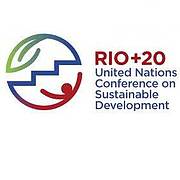20 years on, civil society leads in Rio
22 June 2012 | News story
Governments are leaving the UN’s Sustainable Development Summit (Rio +20) with a big deal but little action. Groups of civil society and business have proved they can lead the way towards a sustainable future.
“It’s a relief that the outcomes of Rio+20 refer to some basic issues of planetary survival – reducing poverty and reviving nature’s health,” says IUCN Director General Julia Marton-Lefèvre. “I’m pleased to see that nature based solutions for the problems facing poor people, forests, oceans and water were firmly on the agenda. It’s only by investing in nature that we can create a green economy and a sustainable future for everyone.”
“But the deal signed here in Rio lays out aspirations rather than specific mandatory goals on issues like food security, water and energy. IUCN would like to see the Sustainable Development Goals deal with the crises facing people and nature through the implementation of the Aichi targets in The Strategic Plan for Biodiversity. We need development goals that apply nature based solutions to address climate change and enhance people’s livelihoods.”
"Contrary to 1992, Rio+20 did not lift global environmental governance," says Poul Engberg-Pedersen, Deputy Director General of IUCN. "The three 1992 conventions were courageous innovations that, however, are still struggling with implementation. The main governance innovations from Rio+20 are another UN Forum with limited power and a promise of Sustainable Development Goals (SDGs).”
“We will contribute to the SDGs and actively support the existing conventions. But decisive innovations in governance must now come at the local and national levels, aimed at landscapes and seascapes where public and private powers and citizens meet to determine in practice the governance of nature's use. IUCN will use its global membership and convening power to facilitate effective and equitable natural resource governance, often in transboundary contexts."
“We had hoped for a more ambitious outcome,” adds Cyriaque Sendashonga, IUCN’s Director of Global Policy. “I hope that the work of civil society and businesses will inspire governments to agree on goals and set the right incentives. We are impressed by the initiatives announced by many local authorities and hope these will carry through into national and international action. We would also like to congratulate the Brazilian Government for its hard work in bringing all countries together to finalise the agreement here in Rio.”
“Rio + 20” as opposed to Rio in 1992, welcomed a strong business participation,” says Gerard Bos, Director of IUCN’s Business and Biodiversity Programme. “During the corporate sustainability forum, more than 2000 participants showcased their current actions and discussed how to scale this up.”
“Business did recognize the role played by civil society and NGO’s, in the last 20 years, to push them to integrate environmental and social aspects in their corporate strategies. Today, progressive business have moved beyond the legal license to operate and integrate social and environmental dimensions to their business models. They will push through more multi-sectoral partnerships and coalitions with civil society and policy makers to scale this up in order to create new level playing fields for all business. We think there is a key role for IUCN to play in this effort to create a just world that values and conserves nature.”
On oceans, Rio sends a clear and urgent call that business as usual is no longer acceptable.
“Ocean health and fisheries are deteriorating. It’s time to move toward business “unusual”. We must honour previous commitments to end overfishing, eliminate harmful subsidies, stop destructive fishing practices, and safeguard coral reefs and other vital habitats for marine life,” says Kristina Gjerde, IUCN’s Senior High Seas Advisor.
The decision to delay a decision on managing oceans beyond national jurisdiction is a deep disappointment. IUCN is committed to work with governments to promote immediate action to safeguard marine biodiversity within and beyond national jurisdiction.
On energy, Rio showed us that inspiration for changing the planet’s future will come less from agreements among world leaders and much more from partnerships that mobilise innovation, investment and action.
“The UN Secretary General’s initiative on Sustainable Energy for All is showing the way, with the governments, the UN, business and NGOs working together to bridge their differences and find a common purpose in changing the planet’s energy path,” says Mark Smith, Director of IUCN’s Water Programme.
The road from Rio now goes on to IUCN’s World Conservation Congress in Jeju, South Korea (6-15 September 2012). With State and NGO members working together, the IUCN Congress will develop and apply the agreements made in Rio.
For more information or to set up interviews, please contact:
Brian Thomson, m +41 79 721 8326, e brian.thomson@iucn.org



